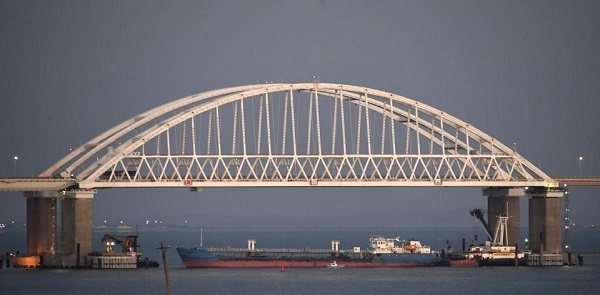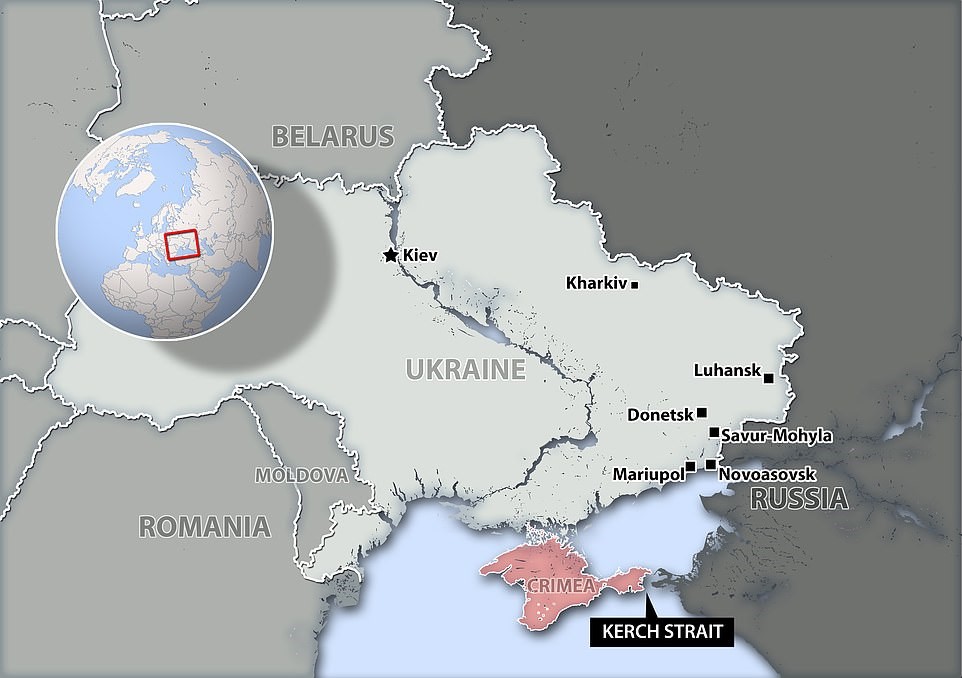Russia seizes Ukrainian vessels
November 26, 2018 | Expert Insights

Russia said that it opened fire on and seized three Ukrainian naval vessels off the Crimean Peninsula, a move that could escalate tensions between the two countries.
Background
The Azov Sea is an important economic lifeline for Ukraine. It links the port city of Mariupol with the Black Sea and 80 per cent of the country's export, now pass through the body of water.
Both Ukraine and Russia share the Azov Sea. A 2003 treaty confirms the Azov Sea and the Kerch Strait as domestic waters of Russia and Ukraine.
Russia annexed Crimea in 2014 and then built a bridge linking it to southern Russia. The $3.69 billion bridge straddles the Kerch Strait - a narrow stretch of water that links the Black Sea to the Sea of Azov, which is home to two of Ukraine's most important ports. The Russian President, Vladimir Putin, officially opened the bridge in May 2018.
Russia's control of Crimea, where its Black Sea Fleet is based, and of the bridge, means it's able to control shipping flows.

Analysis
Russia’s FSB security service said that its border patrol boats had seized the Ukrainian naval vessels in the Black Sea and used weapons to force them to stop.
The FSB said it had been forced to act because Ukrainian Navy ships the ‘Berdiansk’, the ‘Nikopol’ and the ‘Yany Kapu’ were ignoring "legal demands to stop" and were "performing dangerous manoeuvres." Russia had interim scrambled two fighter jets and two helicopters to the area.
Ukrainian President Petro Poroshenko held a meeting with his top military and security chiefs amid talk of imposing martial law.
Ukraine has also requested an emergency meeting of the UN Security Council and has called for international action against Moscow.
The Russians earlier had placed a tanker under a bridge in the Kerch Strait - the only access to the Sea of Azov, which is shared between the two countries.
Ukraine said it had informed the Russians of its plan to move its ships through the sea to Mariupol.
The European Union called on Russia to "restore freedom of passage at the Kerch Strait" and urged "all to act with utmost restraint".
Nato said it "fully supports Ukraine's sovereignty and its territorial integrity, including its navigational rights in its territorial waters". It said Russia should "ensure unhindered access to Ukrainian ports in the Azov Sea".
Russia has not given any indication of how long it will keep the strait blocked off, but a long-term closure to civilian traffic would amount to an economic blockade of Ukrainian cities on the Azov coast. And Russia’s Black Sea Fleet greatly outmatches the Ukrainian navy.
Ukrainian cities on the Sea of Azov include strategically vital centres such as Mariupol — the closest government-controlled city to Donetsk and Luhansk, the breakaway regions of eastern Ukraine controlled by Russia-backed separatists.
The Russian Transport Ministry has periodically closed access to all Ukrainian ships after a July 2017 order that enabled Russia to deny access to the Sea of Azov to any vessels except Russian warships during certain timespans.
As a result, cargo flows from Mariupol have dropped 27 per cent, from more than 8.9 million tons in 2015 to 6.5 million tons in 2017; from Berdyansk, it has fallen 47 per cent, from 4.5 million tons in 2015 to just 2.4 million tons in 2017. Before the Ukraine conflict, freight traffic was much higher, with 15 million tons of cargo passing through Mariupol in 2013 alone.
Counterpoint
Dmitry Kiselyov, a Russian commentator on the state-controlled Rossiya channel, told viewers of his Sunday evening news program that Poroshenko — encouraged by the U.S. — is looking to pick a fight with Russia in the Black Sea.
It said the U.S. talked Poroshenko into staging a provocation against Russia as a means of disrupting the upcoming meeting between President Trump and Russian leader Vladimir Putin at this week’s Group of 20 summits in Argentina.
Assessment
Our assessment is that Russia and Ukraine have been locked in conflict since the annexation of the Black Sea peninsula of Crimea by Russia in 2014, and the incident at sea raises new tensions between the two countries.








Comments